Recent Posts
Preventing Springtime Water Damage
3/25/2024 (Permalink)
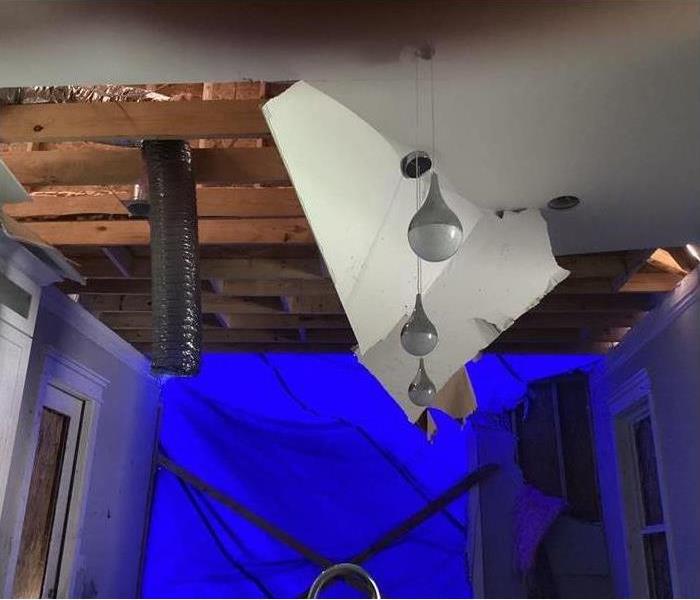 A water damaged roof caving in.
A water damaged roof caving in.
We all know the old saying, "April showers bring May flowers." With springtime comes heavy downpours, which can bring unwanted surprises to light on your property, like roof leaks or water that comes through your home's foundation. Soggy carpets and dripping ceilings often lead to water damage. Have no fear! Taking the following steps can help prevent water damage in the spring.
Tips to Prevent Springtime Water Damage
- Groom your gutters. Keep the flow flowing! By cleaning your gutters and keeping them damage-free, water will be directed away from your house with downspout extensions.
- Cover up! Using plastic covers around window wells can keep rain from seeping in.
- Show your roof some love. Give your roof some much-needed TLC by replacing missing shingles, any damage from storms or weather, and keep flashing sealed. We promise it's worth the effort!
- Be an Einstein landscaper. When putting decoration or landscaping around your home, make sure to slope the ground away from your foundation. This will help prevent water from pooling and causing future water damage issues.
- It's all about the foundation. By repairing cracks and holes in your home's foundation as soon as they are found, you can keep the water away and minimize your odds of water damage!
Contact the professionals at SERVPRO of Southern Memphis today.
Storm Season doesn’t end just because hurricane season does.
3/25/2024 (Permalink)
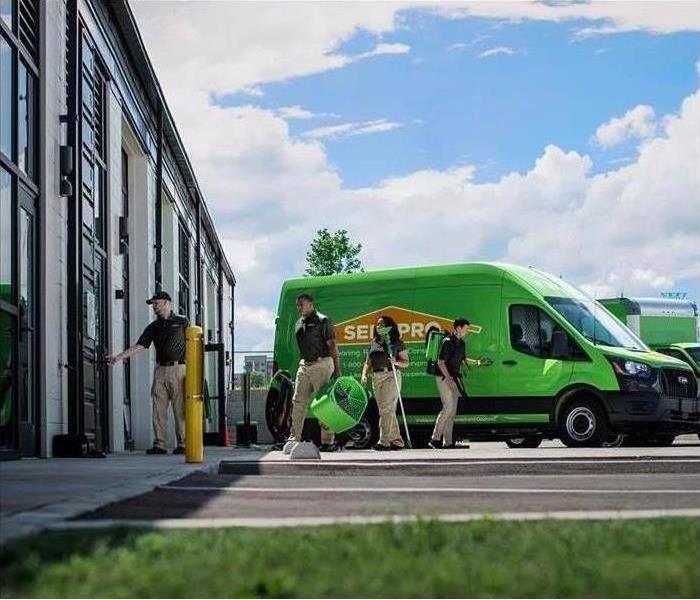 The SERVPRO team loading up vans and preparing to head out for the day.
The SERVPRO team loading up vans and preparing to head out for the day.
Even though storm season is wrapping up rather quickly, a nearby road overflow can cause significant issues a's ground level. Heavy rainfall results in sewer systems backing up and overflowing with contaminated Black Water. Due to the potentially harmful effects of Black Water, it is essential to hire a professional, qualified technician to help repair and restore your property safely. Indeed, many of your possessions can be salvaged by using professional cleaning equipment promptly.
Where there is Flood Damage in SERVPRO® of Southern Memphis homes, the likelihood of contaminants around the home is high. In these circumstances, it is common for our technicians to wear Hazmat suits to protect themselves from pathogens during the cleanup operation. We may also have to remove sections of drywall to clean in and behind walls, floors, and fittings. Left behind debris is not only odorous but has the potential to be harmful if not dealt with thoroughly.
For owners who find themselves in this position, it is only natural to immediately assume the worst, especially where personal possessions are concerned. At SERVPRO of Southern Memphis, we always work with a restore over replace mentality. Unlike other providers, our services are geared toward salvaging as much as possible. We enable our technicians to achieve this by providing them with state-of-the-art cleaning equipment and technology.
We can assess items immediately on-site to decide which possessions are salvageable and which need disposal. Generally speaking, porous materials absorb black water making them exceptionally difficult to clean; this could include your carpets or curtains. However, where they are valuable fabrics, we can send them to a specialized facility for mechanical cleaning using Esporta washing machines. This equipment is expensive because they are advanced. However, SERVPRO Southern Memphis provides technicians with everything they need to restore items rather than replace them.
Floods are considerable emergencies which is why SERVPRO training involves a rapid-response unit as well as a 24-hour emergency call line. Our skilled specialists are local to the area and can reach you fast to help mitigate loss and reduce the risk of permanent damage.
Why should you hire professionals after fire damage?
3/25/2024 (Permalink)
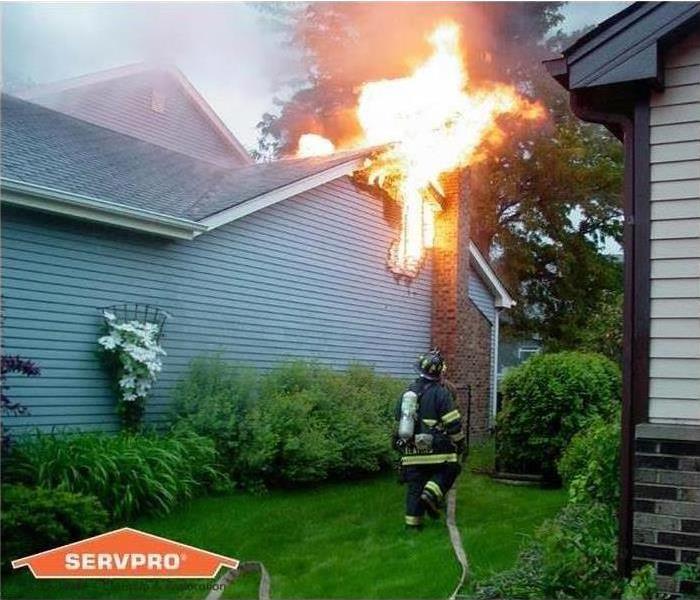 A professional firefighter pulling a hose close to a house fire to start the extinguish process.
A professional firefighter pulling a hose close to a house fire to start the extinguish process.
Fires can happen unexpectedly at any time. Some people are unprepared for what to do for the cleanup after the fire occurs, which is why it is vital to hire a fire damage servicing company to help get it done correctly.
- There are four main reasons why it is vital to hire a fire damage service professional.
- Unforeseen damages – With the unforeseen damages in the home, it is a possibility that it is no longer safe to live in.
- Smoke and soot. – Soot can cover a lot of things in the home and it is very difficult to remove. Smoke has a bad tendency to linger for years and many people don’t realize it’s there. There are many places that smoke can get into besides the obvious like the carpet and furniture. It can be in the walls or air ducts. This sometimes makes the air in the home unhealthy to breathe, especially for children and elderly.
- Right equipment – Many people may try to clean the damages themselves but don’t have the right equipment to do so. Hiring a cleanup service will allow the homeowners to save time and assurance that the home is well taken care of.
- Structural damage – There can be structural damage from fire or the water used to put out the fire. It can lead to big problems in the future if it is not taken care of immediately.
Don’t delay the cleanup process, the sooner the cleanup gets started, the less damage repair will need to be done. If you have any questions, feel free to contact the professionals at SERVPRO!
SERVPRO of Southern Memphis outlines five common causes of water damage in commercial spaces
3/17/2023 (Permalink)
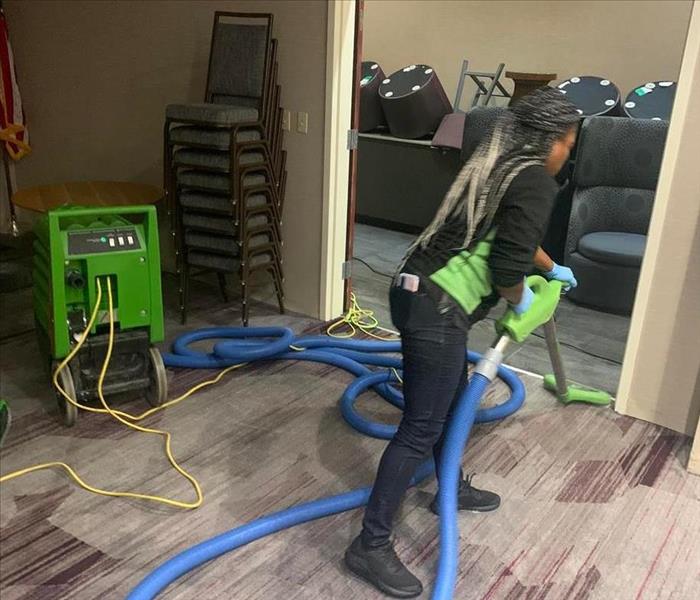 SERVPRO Cleanup
SERVPRO Cleanup
SERVPRO® of Southern Memphis outlines five top causes of water damage in offices, facilities, and other commercial buildings.
Businesses face the same water damage risk as homes and often incur more damage due to the costly and valuable files, machines, and structures in the workplace. As a business owner or manager, it’s essential to embed water damage prevention and restoration into your safety plan to protect your property.
1. Water-using equipment
Leakage is a constant threat if your building has any equipment that uses water. Anything that operates using tubes, gaskets, pipes, or filters has a chance of leaking, including water heaters and air conditioners. You could incur significant damage if the leak occurs after hours.
The best course of action is to routinely inspect and maintain your equipment. Take preventive action if you see anything that’s unusual, like corrosion, cracks, bulges, or indications of dampness. Regularly replace the water supply lines.
2. Damaged roof
Extreme weather conditions like strong winds, rain, or snowfall can damage the roof of your office or facility, allowing water to get in. If this happens, you need to quickly cover up the damaged areas of the roof and call a water damage restoration company to help restore the space.
It’s important to periodically inspect your roof for damage, especially after a storm. Also, ensure you schedule regular roof maintenance to ensure your roof can withstand the elements.
3. Damaged window
Older structures are notorious for having drafts. If it rains heavily enough, windows that aren't properly sealed can even begin to leak, which can lead to moisture issues. While it may not seem like much, prolonged exposure to rain or moisture can cause structural damage, mold, and wood rot.
Ensure all windows on the property are sealed and undamaged as part of the routine building maintenance, and reapply the caulk whenever necessary, as it will naturally weaken over time.
4. Drains and pipes leaks
Pipe leaks are one of the most common causes of water damage in commercial spaces. It should go without saying that your plumbing system is prone to stoppages, obstructions, and damage. Even the smallest fracture could leak 250 gallons of water into your facility.
Keep an eye out for visible indications of dampness, cracking, corrosion, and bulging. Check for scale accumulation if you are having plumbing repair done or if a pipe has been damaged for any reason.
As an alternative, consider installing leak detection systems that activate an alarm when they detect a leak.
5. Sewage backup
A sewage backup can also cause your property to be flooded. This happens when wastewater flows through the sewer system in the wrong direction or when filthy water rises through your drains, sinks, and toilets rather than going down them.
Sewage backups are caused by clogged wastewater lines. So, you need to proactively keep the wastewater system clear to prevent it.
The Different Types of Fire Damage
3/17/2023 (Permalink)
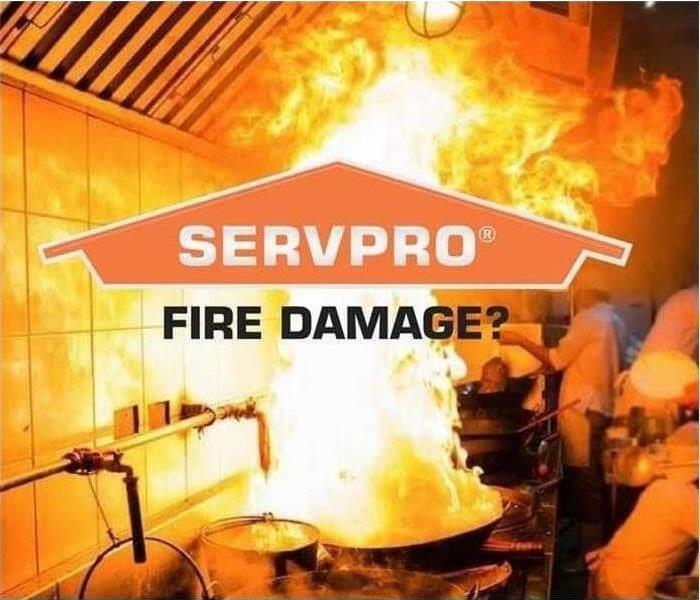 How fires can start.
How fires can start.
Dealing with the damage from a fire can be a long process. The fire could have been small, but the smoke from it did the majority of the damage. On the other side, most of the damage could have been from the fire itself. Lastly, there could have been another layer of damage caused when the fire was extinguished. Here are the main types of fire damage that are commonly dealt with.
Flame Damage - This could be from an electrical outlet that caused damage, all the way to a full-blown kitchen fire.
Smoke Damage - Smoke is literally in the air and can (and will) get into everything. Even after the rebuild is completed, there can still be a lingering smell of smoke to the property unless it is dealt with correctly.
3rd Party Damage - This type of damage comes from any in-house sprinkler system used to put the fire out or from the Fire Department themselves when they get to the scene.
Heat Damage - Even though a part of the structure might have not actually caught fire, it was probably severely heated up. This can cause structural damage and possible swelling that you might not notice right away.
After a fire, you could be dealing with flame, smoke, water and heat damage at the same time. FEMA has some great information on what to do after the fire. The best way to make sure that this is taken care of promptly and properly is to contact the team at SERVPRO to get on the job!
Preventing Mold in Your Home's Closet
3/17/2023 (Permalink)
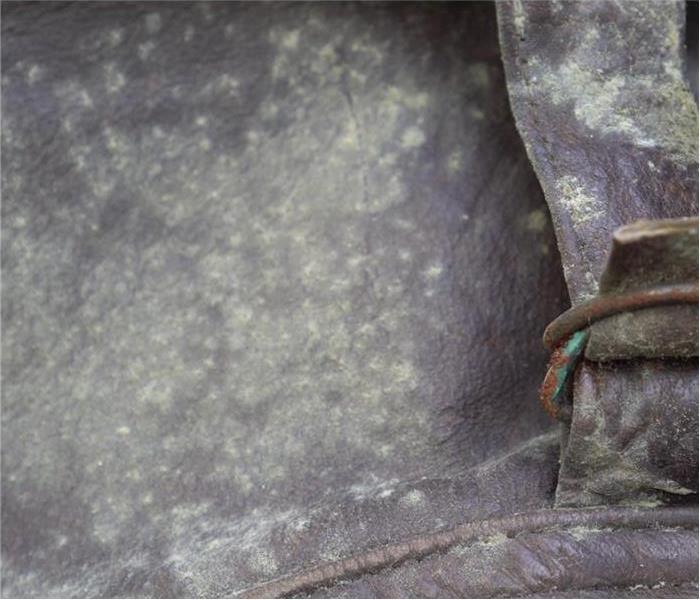 Mold in closet.
Mold in closet.
Mold can grow anywhere in homes, including closets. Here are some tips to keep your closets dry and mold-free!
- Make sure that clothes are completely dry before storing them in closets. The moisture in clothing can accelerate mold growth.
- Store only clean clothing and items in closets as dirt and other organic substances are potential food sources for mold.
- Don’t pack clothes or other items too tightly in closets. Allow air to circulate between them to reduce moisture.
- Don’t store items on the closet floor to prevent trapping moisture underneath them.
- Leave closets open when possible. Replace solid closet doors curtains for better airflow.
- Avoid opening closets if they are in rooms with high humidity, particularly when producing moisture (e.g., showering or cooking).
- If you have a humidity problem in your home, use the air conditioning unit or a dehumidifier to remove excess moisture from the air.
- If clothes in a closet smell musty, take them out and fix the moisture problem.
What to do if your apartment becomes flooded.
3/16/2023 (Permalink)
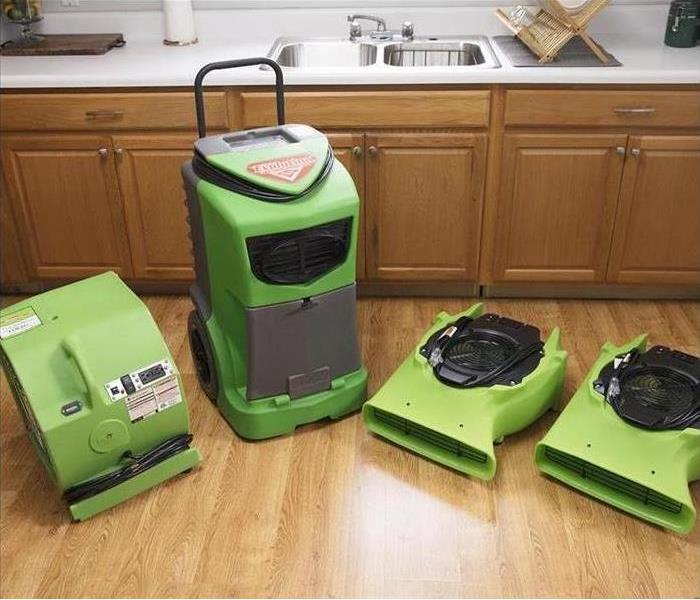 Air Dryers on Kitchen Floor
Air Dryers on Kitchen Floor
SERVPRO® of Southern Memphis highlights the steps to water removal from an apartment.
Being in a flooded apartment is an awful experience. The water can damage your belongings and put you out of your home for days. The effects of a flooded flat are numerous, ranging from mold growth to wet carpets and broken furnishings.
As a homeowner or renter, you must act fast when faced with water damage to limit the level of damage. The starting point is to get all the water out of the building.
The water restoration specialists at SERVPRO of Southern Memphis, a leading water removal company in Tennessee, have outlined the following tips for water removal in a flooded apartment.
1. Identify the cause of the flooding
Floods vary greatly from one another. Flooding from ruptured frozen pipes is different from flooding caused by a sewage backup. Identifying the precise cause of the flooding will increase the chances of quickly solving the issue.
Let's say the flooding in your residence results from a blocked and overflowing toilet. You may close the water valve supplying the toilet to prevent the flooding from getting worse.
2. Pump out the water
A pump can be helpful if you have standing water several inches deep. But, it’s important to pump slowly, as pumping water out too quickly could undermine the property’s foundations.
Sump pumps can be rented for approximately $50 per day or bought for $100 and higher. However, it’s always best to engage a water damage restoration expert, as they have the required tools, including industrial water pumps.
3. Use a bucket
Another way to get water from your property if you don’t have a pump is with a bucket. It’s very straightforward; pack the water in the bucket and pour it outside or inside a larger container, which you’ll discharge outside.
While this is economical, removing water with a bucket can be very stressful and time-consuming.
4. Contact your neighbors
Notifying your neighbors of the flood in your apartment is polite, especially if you have downstairs neighbors.
Depending on the extent of the flooding, the water can easily flow into their flat from the ceiling. Giving them advance notice will prevent that unpleasant surprise and allow them time to take preventative measures.
5. Speak with your landlord
The next step is to contact your landlord if you rent rather than own your unit. You should contact your landlord as soon as possible to inform them about the problem because they are in charge of preventing damage to the property, including water damage.
6. Secure your belongings
If your apartment is flooded, you most likely won't be able to shield all of your belongings from water damage. You should relocate anything you can from the flooded area to prevent massive damage. The items can be kept in a room far from the flooded area or placed high enough so that the water won't reach them.
Grab as many belongings as you can if you have to evacuate your house due to flooding.
7. Speak with your insurance provider
Renters' insurance is a must if you rent a place. While the expense of fixing the structure is your landlord's responsibility, the loss of your personal property is probably covered by your renter's insurance policy.
However, keep in mind that damage from some types of flooding is typically not covered by renters' insurance. For instance, unless you have a particular flood rider, your renters' insurance usually won't cover the damage if your apartment floods during a hurricane.
Get professional water removal services in Harahan
You can rely on SERVPRO of Southern Memphis to handle water removal in your apartment. Their team of certified water damage technicians is trained to clean up water damage as quickly and effectively as possible. They will arrive at your home with state-of-the-art tools to clean, dry, and restore the apartment and belongings to their preloss state.
Are you ready to get started? Call SERVPRO of Southern Memphis at(901) 505-0715 to request their services.
What to do When You Return to your Home After Storm Damage!
12/19/2022 (Permalink)
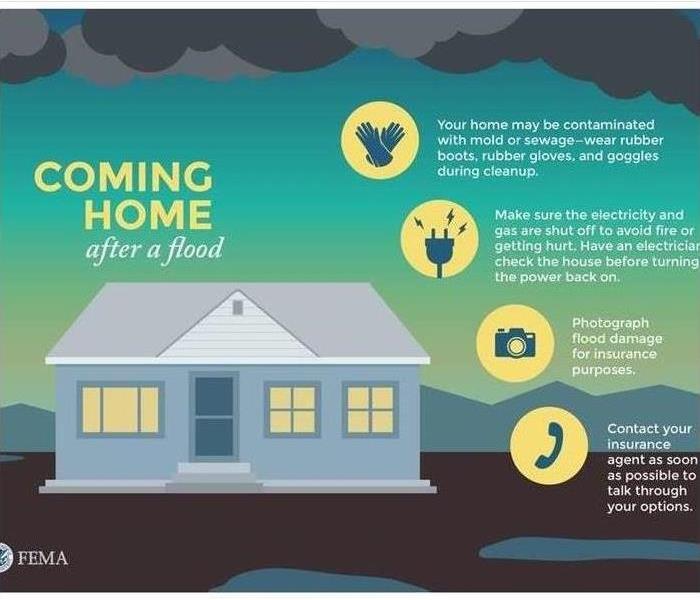 Coming home after a flood diagram.
Coming home after a flood diagram.
When storms send floodwater into your home, you don't always know what to do. When is it safe to return to your house? Can you start the cleanup on your own? How you handle a flood will depend on the severity of the damage. It can be helpful to call about storm damage services right after the storm has left your area. You should also try to avoid doing the following:
1. Walking Into Standing Water
Did you know that 6 inches of moving water can cause you to lose your footing? Because even shallow waters can be dangerous, you should avoid walking into any standing water. Your flooded home may be full of stagnant water, but you should still avoid going into it. If the electricity is on, the water could be charged. Storm water could contain dangerous contaminants, too.
2. Waiting To Schedule a Cleanup
Do you want to try to tackle the water damage on your own? Unless you know how to effectively remove flooding and humidity from your house, you should turn to a professional. The sooner you can schedule your cleanup, the better it will be for your home. If you wait too long, you may have increased mold growth in your space.
3. Returning to Your Home Too Soon
While you want your life to return to normal, you need to make sure the flood water is completely gone before you return. Going home too soon can make it harder for the cleanup crew to properly remove excess humidity. The cleanup may require building materials to be replaced, which can leave your home dusty. If you wait until the entire process is finished, you can return to a more normal life right when you move back in.
Storm flood water may cause you to leave your home until the damage can be fixed. Taking the wrong steps after this type of flood can make the restoration process harder than it has to be, so remember what not to do. You can find more detailed information from Ready.gov.

 24/7 Emergency Service
24/7 Emergency Service







